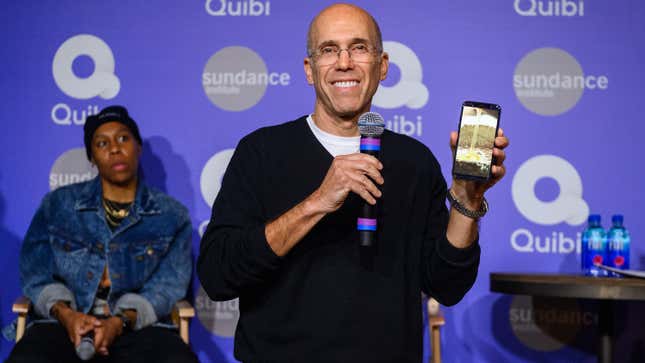

In the lead-up to Quibi’s launch, it seemed as if every other day a new show starring a new celebrity was announced for its roster. Quibi, a streaming service that specializes in shows with 10-minute episodes, was meant to capitalize on the allegedly short attention spans of millennials and Gen Zers by featuring quick hits with stars like Reese Witherspoon, Chrissy Teigen, and Sophie Turner Jonas. But not even Zac Efron’s attempt to live out his most Bear Grylls fantasies was enough to propel the start-up to its projected potential, despite varying reports that all was well in the halls of Quibi.
In a May interview with the New York Times, Quibi’s cofounder Jeffrey Katzenberg attributed Quibi’s poor performance to the onset of covid-19, saying that his model for the platform’s success relied heavily on cellphone use while people were in transit. But with nowhere to go and nothing to wait for, viewers returned to binging good old fashioned long-form television. While covid-19 has certainly played a role in the downfall of many things, it’s possible that Katzenberg’s pet project was too big. A new Vulture feature explains that Katzenberg is paying creators and celebrities at a premium, in order to ensure the site would have enough content to sustain itself. “People on Quibi have $100,000 a minute to make content,” Katzenberg told Vulture. “That doesn’t exist on other platforms.”
But as the great Countess LuAnn once said, money can’t buy you class. It also couldn’t buy a hit show for Quibi to hang its hat on. Instead of riveting bites of short-form television, Quibi greenlighted just about anything that producers could imagine. Vulture explains:
For producers of unscripted shows, Quibi offered a rare chance to make their silliest ideas, like Barkitecture (exotic luxury kennels are made for dogs) and Dishmantled, in which two blindfolded chef-contestants are blasted with a cannon load of mystery-food gloop and must identify the ingredients by taste, then use them to reconstruct the dish. Quibi’s future seemed unlimited, and for a moment, when it launched on April 6, it looked as if all of Katzenberg’s glorious predictions might come to pass.
Katzenberg’s vision for Quibi wasn’t just firmly planted in the idea that TV could be improved upon by being shorter and more movie-like—he also firmly believed that people would pay for the 10-minute equivalent of prestige TV. “People pay for convenience and premium. Ad-supported TV was at its peak when HBO launched,” Quibi’s CEO Meg Whitman told Vulture when describing the pitch meeting that resulted in her partnering with Katzenberg. HBO’s first original scripted series was Oz, a show set in a prison that capitalized on America’s fascination with incarcerated people and corrections officers before the market could be oversaturated with real-life crime shows. Quibi launched with Most Dangerous Game, a show starring Liam Hemsworth as a man being hunted for sport by wealthy people. Humans hunting humans is unoriginal and played out.
Quibi, which was the No. 3 app on the Apple store when it launched, has now dropped to No. 284 on the list, and its shows are largely panned as failures among critics. Vulture notes that the app’s initial free trials expire in July and that if the industry average of under 33 percent of free-trial sign-ups transition to subscriptions, “it could mean less than 500,000 people would be watching a network that spent hundreds of millions of dollars on brand-new premium content.”
But the takeaway from Vulture’s piece is not a warning about lavish spending or over-reliance on celebrity, but a lesson in hubris. Katzenberg and Meg Whitman, Quibi’s CEO, had years upon years of combined experience in business and television production, which allowed Katzenberg to leverage his relationships with studios and actors to bring Quibi to life despite the fact that it’s just a more premium version of YouTube.
Vulture reports that Quibi still has $750 million left in the bank to keep them floating. When asked by the news outlet if he was worried about the streaming service failing and becoming obsolete Katzenberg said, “I would say things are going really well.” A friend of Katzenberg countered that by telling Vulture, “He’s disappointed. But he ignores the possibility of failure in the pursuit of success. That’s who he is.” Read the Vulture piece here.